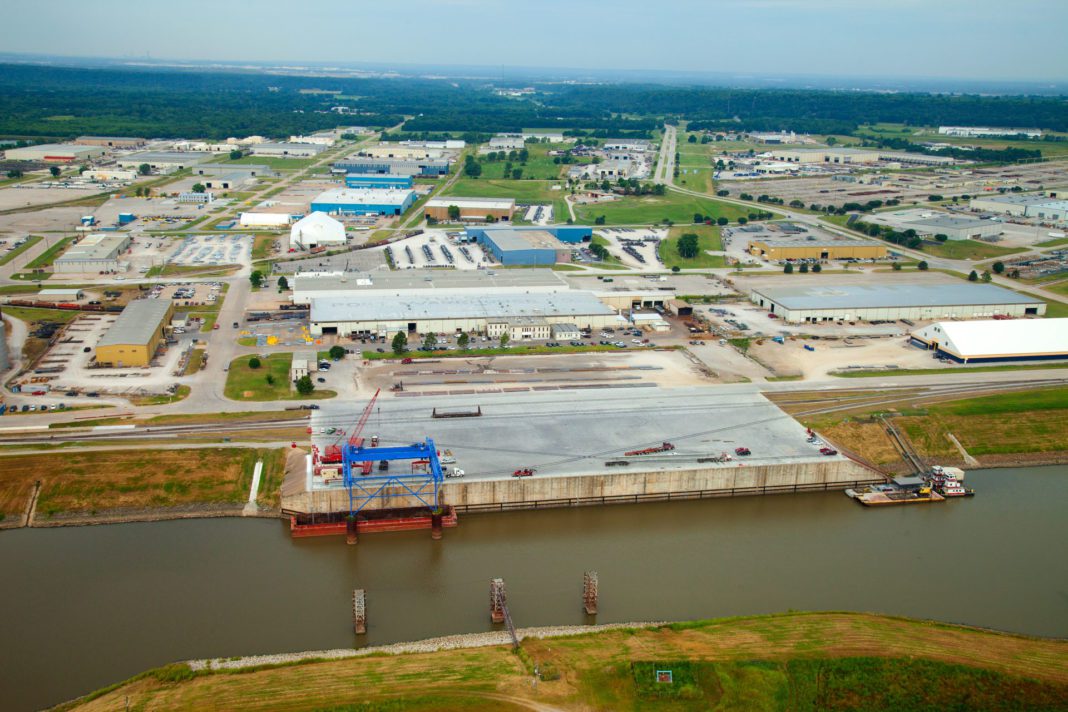Supply chain disruptions won’t be easing anytime soon, but Oklahoma transportation industry leaders are doing their best to mitigate the aggravation.
“We want to be part of the solution and help the supply chain,” says Dan Grisham, deputy director of the City of Tulsa-Rogers County Port Authority, which does business as Tulsa Ports. “It’s just not going to be overnight. We are not going to see any relief until well into 2022.”
The size of the ships is one problem, says David Yarbrough, director of Tulsa Ports.
“These big ships come from Asia, unload at the West coast, and then the cargo moves by rail to transportation centers, and then goes on trucks to our stores,” says Yarbrough. “Because that was so profitable, ship companies made bigger ships. Ships are so large now that most of them can’t come into New Orleans and other ports – they have to come to Los Angeles-Long Beach. This is why you hear of channel-deepening projects, to dredge our gulf ports to depths that allow larger vessels.”
Yarbrough thinks the inland river system, which Tulsa Ports is part of on the Arkansas River, could help to ease the logjam.
“The ports in the Gulf of Mexico could begin to accept lighter ships,” he says. “We know the inland river system has more capacity. We would put containers on barges. Our inland rivers could be a part of the solution to getting goods to market quicker than we are today.”
‘Driver appreciation’ is the key phrase at Melton Truck Lines in Tulsa, which has raised pay rates several times this year in an attempt to ease the driver shortage.
“We can’t find enough drivers, so trucks are sitting empty and idle,” says Angie Buchanan, Melton’s vice president of operations.
Melton owns about 1,300 trucks and employs about 1,200 drivers. The company recently began a partnership with a driving school at its international headquarters in Tulsa, Buchanan says.
“We just raised the pay for people in training, which is exciting for them and expensive for us, but you can’t expect these people to seek out the training and have no income,” she says.
The company pays for room, board and tuition while students attend the three- to four-week school, then a salary kicks in as they progress to the apprenticeship phase.
“Our recruiting and retention of veterans is pretty incredible,” says Buchanan. “It doesn’t matter what they did in the service, they just fit in really well. They are resourceful, they are adventurous, they are accustomed to travel.”
TBS Factoring Service in Oklahoma City provides services to freight owner-operators.
The trucker shortage “has been going on for several decades,” says Hailey Benton-Thomas, CEO of TBS. “E-commerce is a big part of it. The market evolved before our infrastructure did.”
COVID-19 exacerbated the problem, with consumers spending COVID relief checks, ordering more household essentials online and sprucing up their homes with big-ticket items that were soon placed on backorder.
“I think there will come a day in the near term when the trucking shortage will get even worse,” says Benton-Thomas. “As trucks start to go out of service, we will have a hard time replacing them with new ones. It’s a complex problem that can’t be solved by any one logistics group, or just the government.”
Her company is investing in technology to help its clients operate efficiently.
“We take care of anything they can’t do from the cabs of their trucks,” she says. “We help them find loads, take care of their taxes and permits – all those services a trucker needs to stay in business, so they can spend every minute they can driving.”


























